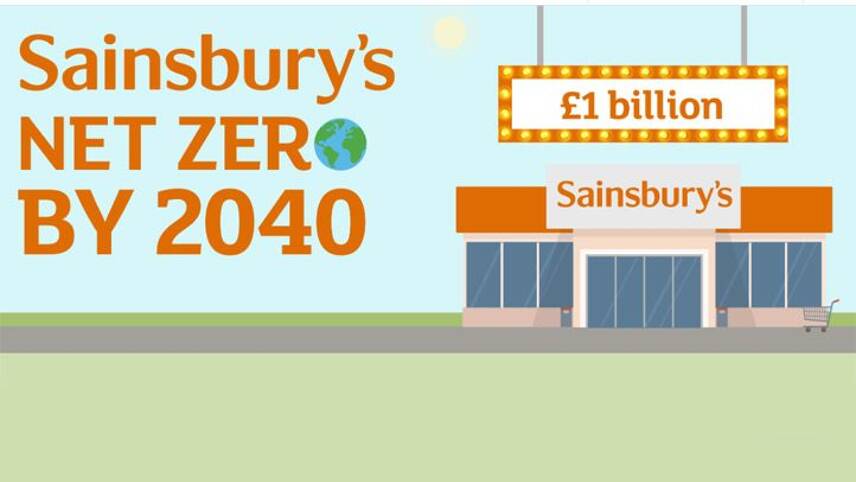Register for free and continue reading
Join our growing army of changemakers and get unlimited access to our premium content

Sainsbury’s will work with suppliers to help them set individual net-zero commitments
Sainsbury’s has today (28 January) committed a £1bn investment to implement a raft of programme changes to reduce carbon emissions, food waste, water use and plastic packaging while increasing biodiversity and improving healthy and sustainable eating for customers.
The headline ambition of the new programme is a commitment to reach net-zero emissions by 2040 – 10 years ahead of the UK Government’s net-zero target and aligned to the highest ambition of the Paris Agreement.
Sainsbury’s chief executive Mike Coupe said: “Our commitment has always been to help customers live well for less, but we must recognise that living well now also means living sustainably.
“We have a duty to the communities we serve to continue to reduce the impact our business has on the environment and we are committing to reduce our own carbon emissions and become net-zero by 2040, ten years ahead of the government’s own targets, because 2050 isn’t soon enough.”
The investment will cover Sainsbury’s Scope 1 and 2 emissions and the retailer will work with the Carbon Trust to set science-based targets. The retailer’s current carbon footprint is one million tonnes, which is a 35% absolute reduction in the last 15 years despite the size of the company increasing by 46% over the same timeframe.
Sainsbury’s will work with suppliers to help them set individual net-zero commitments.
The retailer has previously invested £260m across more than 3,000 sustainability initiatives in the past 10 years, including a nationwide LED lighting programme – by the end of 2022, all Sainsbury’s stores will be 100% lit by LED – and a focus on natural refrigerants.
Broader strategy
Sainsbury’s will now work to increase its use of renewable energy use while reducing energy consumption. Natural refrigerants will continue to be scaled up across stores and 20% of the company’s fleet will use low-carbon or zero-carbon fuels by 2025.
On water, Sainsbury’s already uses one billion litres less annually compared to 2005 and is targeting water-neutrality by 2040.
More broadly, Sainsbury’s has targets in place to halve plastic packaging by 2025, halving food waste by 2030 and will ensure that the impact of its operations is net positive for biodiversity
Sainsbury’s has sent no food to landfill since 2013 and runs more than 2,000 food donation programmes to combat food waste. In total, 87% of Sainsbury’s stores redistribute food.
COP26 President-Designate Claire O’Neill said: “It’s fantastic to see Sainsbury’s committing to hitting net-zero by 2040. It’s vital that big organisations recognise the responsibility they have in curbing emissions.
“Today’s announcement is an outstanding example that being green shouldn’t be a barrier to success. I hope to see other major supermarkets following their lead ahead of the COP26 UN climate conference later this year in Glasgow.”
On diets, Sainsbury’s is working towards 100% sustainably sourced seafood by the end of 2020 and sources more than 98% of palm oil used in 1,700 own-brand products from sustainable sources. Sainsbury’s will ensure that 100% of soy-derived from “high-risk” origins is certified as sustainable and doesn’t contribute to deforestation.
The new net-zero commitment makes no mention of offsetting, but Sainsbury’s has planted more than 3.8 million trees during a fifteen-year partnership with The Woodland Trust and will plant a further 1.5 million trees by 2025. According to the retailers, this has the potential to mitigate 375,000 tonnes of CO2.
Commenting on the announcement, Friends of the Earth’s head of policy Mike Childs said: “It’s encouraging to see Sainsbury’s stepping up to the plate on the climate emergency – the rapid transition to a net-zero economy is urgently required. Supermarkets have a huge influence on our personal carbon footprints, so the more they can do to embrace and encourage greener lifestyles the better for us all.
“Encouraging and supporting the switch to a more plant-based diet is particularly important – eating less, but better quality, meat and dairy would be healthier for people and the planet. The influence supermarket chains have over suppliers is also huge – they must use that to encourage better environmental standards while ensuring a fair deal for farmers.”
Matt Mace


Please login or Register to leave a comment.